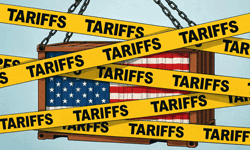Trade tensions can reshape markets fast — but will a U.S.–Canada trade war really sweep American franchise brands out of Canada and replace them with homegrown alternatives? The short answer: it’s possible under certain conditions, but far from inevitable. Below we weigh both sides.
.
The “Yes, it could happen” case
- Tariffs and higher costs As tariffs, import restrictions and punitive cross-border measures raise the cost of U.S. goods, U.S.-linked franchise operators may see margins squeezed. Many quick-service restaurants and retail chains depend on U.S. supplies, branded ingredients, or centralized purchasing. Higher costs are making U.S. franchise models less profitable, slowing unit growth, and opening the door for local brands with cheaper, local supply chains.
- Political and consumer backlash A protracted trade dispute often sparks nationalist consumer sentiment. Canadian shoppers and provincial governments are favoring “buy-Canadian” campaigns, preferential procurement, and promotional support for domestic franchisors — especially in visible sectors like food and convenience. Public-sector contracts and municipal approvals are also being nudged toward local players.
- Franchisor retrenchment and market exit If head offices in the U.S. face regulatory hurdles, currency volatility, or logistical headaches, some franchisors might pause or abandon Canadian expansion. Vacated territories are attractive to Canadian multi-brand operators that can move quickly, leveraging local knowledge, cheaper real estate, and flexible concepts to fill the gap.
- Regulatory advantage for local entrants Canadian franchisors often understand provincial regulations better and can optimize tax, labor, and permitting strategies. During trade frictions, those regulatory advantages become strategic differentiators, lowering the barrier for domestic chains to scale into formerly U.S.-dominated niches.
.
The “No, it’s not a serious threat” case
- Brand equity and consumer preference Many American franchises sell more than a product — they sell an experience. Deep brand recognition, decades of marketing, and unique supply recipes make them sticky.
- Legal contracts and franchise law Franchising is built on long-term agreements. Franchise licenses, territory rights, and contractual protections make abrupt replacement costly and legally fraught. Local governments can’t simply substitute brands without navigating property leases, franchisee rights, and investor claims.
- Scale and capital requirements Replicating a national footprint requires capital, operational expertise, and supply-chain scale. Many Canadian franchisors don’t have the resources to immediately replace dozens or hundreds of US outlets in Canada. Even multi-brand roll-ups need time to adapt concepts and rollout playbooks.
- Interdependence and mitigation Businesses can adapt: franchisors may re-source locally, alter menus, or absorb costs to preserve presence. Trade disputes rarely remain one-dimensional; mitigation strategies, exemptions, or negotiated settlements often restore enough normalcy for U.S. franchises to persist.
.
Bottom line
The trade war has accelerated openings for nimble Canadian chains in specific regions and sectors — particularly where supply-chain substitution is easy and consumer nationalism is strong. But wholesale replacement across the country faces steep obstacles: legal protections, entrenched brand loyalty, capital intensity, and the ability of U.S. franchises to adapt. Expect selective displacement (pockets and categories), not a blanket takeover. The real outcome will depend on policy duration, depth of economic disruption, and whether Canadian operators can scale fast enough to seize the moment.

